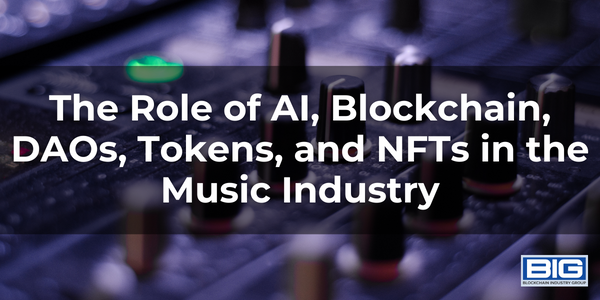
The music industry has undergone a significant transformation in recent years, fueled by technological advancements and digital innovation.
In this article, we explore the profound impact of artificial intelligence (AI), blockchain technology, decentralized autonomous organizations (DAOs), tokens, and non-fungible tokens (NFTs) on the music ecosystem. We delve into how these technologies are revolutionizing music creation, distribution, ownership, and fan engagement.
AI-Driven Music Creation and Production
Artificial intelligence is increasingly playing a crucial role in music creation and production. AI algorithms can analyze vast amounts of musical data, patterns, and genres, enabling the generation of new compositions, melodies, and harmonies. AI-powered tools and software can enhance creativity, assist in the production process, and even emulate the style of renowned artists.
Example: Jukedeck and Amper Music
Platforms like Jukedeck and Amper Music leverage AI to create original music tracks tailored to specific needs. These platforms use algorithms to compose music that aligns with desired moods, genres, and durations. AI-generated music offers opportunities for content creators, filmmakers, and game developers to access affordable and customizable soundtracks while significantly reducing production time.
Blockchain for Transparent Royalty Payments and Rights Management
Blockchain technology has the potential to revolutionize royalty payments and rights management in the music industry. By utilizing blockchain’s decentralized and immutable nature, artists, songwriters, and producers can have more control over their intellectual property, ensuring fair compensation and transparent transactions.
Example: Imogen Heap and Mycelia
British singer-songwriter Imogen Heap pioneered the use of blockchain in the music industry with her Mycelia project. Mycelia leverages blockchain to create a comprehensive database of music rights and licenses, enabling more efficient and transparent royalty payments. Smart contracts automatically facilitate the distribution of payments to all involved parties, ensuring a fair and streamlined process.
Decentralized Autonomous Organizations (DAOs) for Collaborative Music Projects
Decentralized autonomous organizations (DAOs) are emerging as a new paradigm in the music industry, facilitating collaborative projects, fan engagement, and community-driven decision-making. DAOs allow artists, fans, and stakeholders to participate in the creation, funding, and governance of music-related initiatives.
Example: Bitmark and Project Pico
Bitmark is a blockchain-based platform that enables artists to create DAOs for funding and distributing their work. Project Pico, an experimental DAO, involved fans in the decision-making process of a music video’s creative direction, budget allocation, and promotion strategies. DAOs empower artists and fans to form strong connections, co-create content, and collectively shape the direction of the music industry.
Tokens and NFTs: Redefining Music Ownership and Fan Engagement
Tokens and non-fungible tokens (NFTs) have opened up new avenues for music ownership, fan engagement, and monetization. NFTs represent unique digital assets and enable artists to tokenize their music, granting fans ownership rights and exclusive experiences.
Example: Kings of Leon and NFT Album Release
AI-Driven Content Types and Creation Ideas
—
AI-Driven Supply Chain Management: Transforming Logistics with Blockchain, DAO, Tokens, and NFTs
—
AI-Powered Services: Top 5 Ideas
American rock band Kings of Leon made headlines by releasing their album “When You See Yourself” as an NFT. Each NFT included exclusive content, such as limited edition vinyl and concert tickets. By tokenizing their album, the band provided fans with a unique opportunity to own a piece of music history while generating new revenue streams.
The convergence of AI, blockchain, DAOs, tokens, and NFTs has brought forth a wave of transformation in the music industry. From AI-driven music creation to transparent royalty payments, collaborative DAOs, and tokenized ownership, these technologies are reshaping how music is created, distributed, owned, and experienced. As the music industry continues to embrace these technologies, we can expect further innovation, increased fan engagement, and a more equitable ecosystem that benefits artists and music lovers alike.



